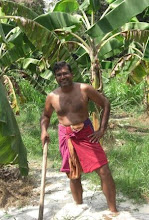There is so much
pontificating words written about sustainable agriculture and I believe very
little of that comes directly from someone who earns 100% of his income from
existing agriculture, sustainable or not.
Why is that? The
person who is a full time farmer cannot see the practical side of the concept
as he cannot contemplate doing without many of the inputs he has become
accustomed to. He cannot see that he can earn a comfortable income following these
principles. After all he wants a life, like all of us. In my experience it is
only theoretical farmers who have other income means who practice this in a
serious way, and by so doing they grossly under price in terms of the market
place. The reason is that if the true economic cost was charged, no one will
buy. I can vouch for that as I also attempted to do the same and discovered how
expensive it really is, especially to do it on a small scale.
While I believe
there are merits in sustainable agriculture, there is no concerted effort to
bring the two opposing factions together or to bridge the gap. The poles are so
extreme that people in either camp despise those of the other. Into this
argument are those who espouse green agriculture and those who term that green
is greed in a veiled guise. After all the Green Revolution whilst increasing
yield had as a direct result the abandonment of thousand years of practices and
techniques purely in the interests of extra yield in order to save the world
from starving.
So what is the
bottom line? We must attempt to explain it coming from the results of existing
practices (post green revolution) that are promoted or are in current use.
Well it is that
our land is being severely polluted. Sri Lanka uses 10 times as much chemical
pesticides and weedicides over recommended usage. I was shocked at a picture I
saw in an article by the reputable environmental advocate for agriculture, Dr
Ranil Senanayake, which showed a diagram of the seas of the world and the seas
around Sri Lanka were the MOST polluted of all the seas. If that is not scary I
don’t know what is. I was shocked into being aghast staring at it for a while
wondering how we in this country got into that state of self destruction.
Now it is up to
the political will of our people. Can we ban their use? Yes but not unless we
have an alternative in place which is at least as acceptable. We were a country
with supposedly 3000 varieties of rice. We probably grow at most 15 varieties
now. We DO NOT use transplant techniques to weed and instead use pesticides and
chemicals. The Govt. in their foolish wisdom, came into power by promising the
continuation of a fertilizer subsidy, that is both costing the country Rs50B
per annum, but which has now resulted in a huge set of medical problems from
the seepage of these chemicals into the water table, and could shortly decimate
our population if not checked, like malaria never did!!
The
environmental lobby advocate small farming, and decry the large farms and their
control over land and also labor, by making slaves out of small subsistence
farmers, but that argument is very disingenuous as there is no way if the
country wants a GNP of $5000 a year, that these small farmers can remotely get
to even a fifth of it!!
As long as some
NGO pays their airfare to Rio and they can interact and bullshit with fellow
environmentalists, the farmer in the 2 acre field is left destitute eitherway
and so if we advocate NO use of chemicals, who is there to guide him in the
practice? He needs his hand held for a while before he can embrace the
alternatives. Along with the change of direction, go obligations, expectations,
and behavior modification, which we expect the poorest sections of our society
to engage in when the wealthy smugly do not even budge from their inertia, but
pontificate.
Unless the whole
process engages a holistic change in the food chain from education of eating
habits, to the need for paying more for food items with worms as being healthy
for you, to methods of storage and transport that ensure that most of the
benefit accrues to the farmer and not the intermediary, it will not succeed. A
rational and commonsense way of eliminating the middlemen in the food chain
along with the mafia who control and therefore hype the price to the consumer,
whilst at the same time pressing down the price to the farmer is the only
answer.
I do believe
that even if we have half the yield, we can still feed the population, by
changing eating habits to healthy from volume, and from mostly closely grown
than from transported from afar, to reduce the carbon footprint. We must simultaneously
address wastage, reduce length and cost of transport, and ensure above all,
education of the consumer.


1 comment:
golden goose sneakers
hermes outlet
nike off white
hermes bags sale
off white outlet
Post a Comment